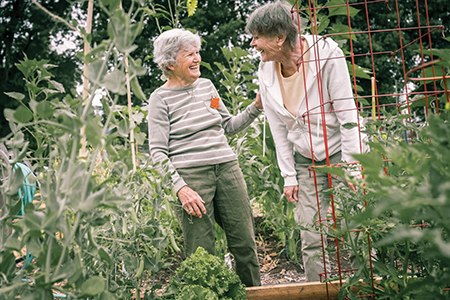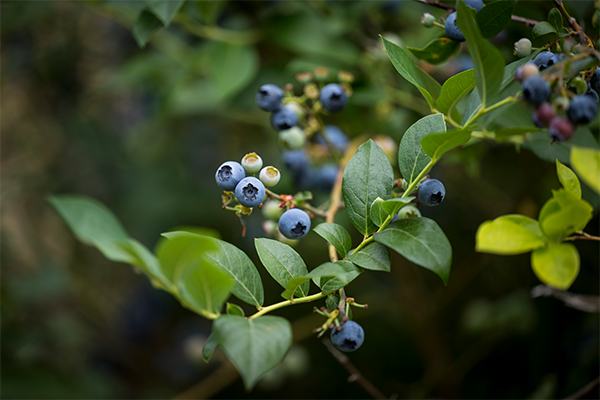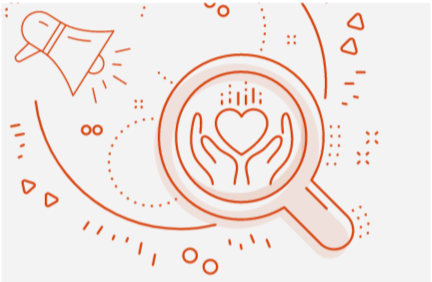Paired with Master Gardeners, cancer survivors cultivate healthy habits and community
For the first time, Carol Ruggeri is tending her own garden, a healthy vegetable plot that gives her respite. Tomatoes, butternut and zucchini squash, lemon cucumbers and snow peas look healthy and vigorous despite the variable weather this spring.
“I lived in Newport for 29 years,” said Ruggeri, a pancreatic cancer survivor. “Between the slugs and the weather, you couldn’t grow anything. That’s why I’m so excited.”
Ruggeri is part of Hope Grows Here. Each spring, just in time for planting, the program matches cancer survivors like her with Master Gardeners who work with them from seed to harvest. The program is a collaboration between Oregon State University Extension, the Moore Family Center and the Linus Pauling Institute. Samaritan Health Services and Pastega Regional Cancer Center help with recruitment.
Laurie Labbitt, a Master Gardener since 2008 and Ruggeri’s mentor, became part of Hope Grows Here in its first year in 2021. The experience was so rewarding, she decided to do it again.

“I like to garden and have lots of experience,” said Labbitt, who has been putting a trowel in the ground for most of her life. “I thought, ‘This is a program I can be part of.’”
So far, it fits Ruggeri, too. She finds the community gardens at Calvin Presbyterian Church in northwest Corvallis calm and serene. Hundreds of birds lend their song and tall, spreading trees cast shade over a picnic table where gardeners can take a break. The sunny beds in the large garden look ready for the season, neat and tidy before the swelling of summer.
“Just to be able to plant a plot and water it and watch it grow is so peaceful,” Ruggeri said. “There’s no one here in the morning so I can wander around and look at the other gardens and get ideas and inspiration."
"It’s my moment of Zen when I get to be all by myself with the birds singing.”
Hearing about Ruggeri’s healing moments in the garden is heartening to Candance Russo, project coordinator and program manager for the Moore Family Center and Emily Ho, director of the Linus Pauling Institute and the principal investigator. Together, they wrote the $50,000 grant from Oregon Health and Science University that made the program a reality. An additional $100,000 grant from the Allen Foundation has allowed Hope Grows Here to continue into 2024.
“Research shows the power of vegetables in preventing or slowing down cancer,” Ho said. “We know vegetables like broccoli are great for that, but it’s a struggle to get people to eat it. We want to know how we can get the science full circle and help high-risk people like cancer survivors have an easier way to adopt these behaviors and stay healthy.”
Their inspiration was the evidence-based Alabama Harvest for Health, a randomized study that measured whether cancer survivors adopted healthy behaviors after going through a garden mentoring program. Participants’ vegetable and fruit consumption increased by approximately one serving a day, more than 91% stayed in the program and 85% said they would do it again. Though Hope Grows is only in its second year, a survey of its participants has already shown improvement in mental health, physical activity, and increased fruit and vegetable consumption.
According to Ho, the program is an effort to connect science with community. After cancer treatment there is a gap in support. Survivors, who get so much contact with providers during treatment, are left on their own. “This is an opportunity to create peer support and one-to-one support,” she said. “Gardening hits lots of buckets in terms of health.”

Participants don’t need to be beginner gardeners to join the program, said Janet Throop, a second-year mentor and 40-plus year Master Gardener. Her mentee already knew a lot about gardening but really blossomed under Throop’s guidance. That was gratifying to Throop who saw her pain and wanted to help.
"She gained a lot of relaxation and benefits being out here and having the garden to escape from thinking about illness,” Throop said.
On a mild spring morning, Ruggeri used the picnic table under the trees to chat with her mentor about the new-this-year get-togethers organized by Russo, who is happy to see the program expand. The gatherings represent what was intended in the first place: mentors and participants meeting in person to share their experiences and create community.
The time seemed right for Ruggeri to get involved. She’d just finished treatment when she saw a flyer on a hospital bulletin board. After moving to Corvallis during the pandemic, she was anxious to make friends and thought the program would be a good way to connect. With her newfound relationship with Labbitt and the bi-monthly get-togethers, she’s on her way.
This spring, 13 participants and 12 mentors joined Hope Grows Here, which encompasses Linn and Benton counties. The mentees start with a four-session beginning gardening course. Most got so much out of it that they decided to stay for the entire 20-week intervention.
“Growing and eating fresh fruit and vegetables has a calming effect and reduces the anxiety of life,” said Ruggeri, who received a bucketful of tools, tomato cages, beginner gardening book, fact sheets and topsoil from the program. “I go to the garden twice a week, if not more. It’s nice to have something growing and producing and to know I have a part in it going on the table.”

